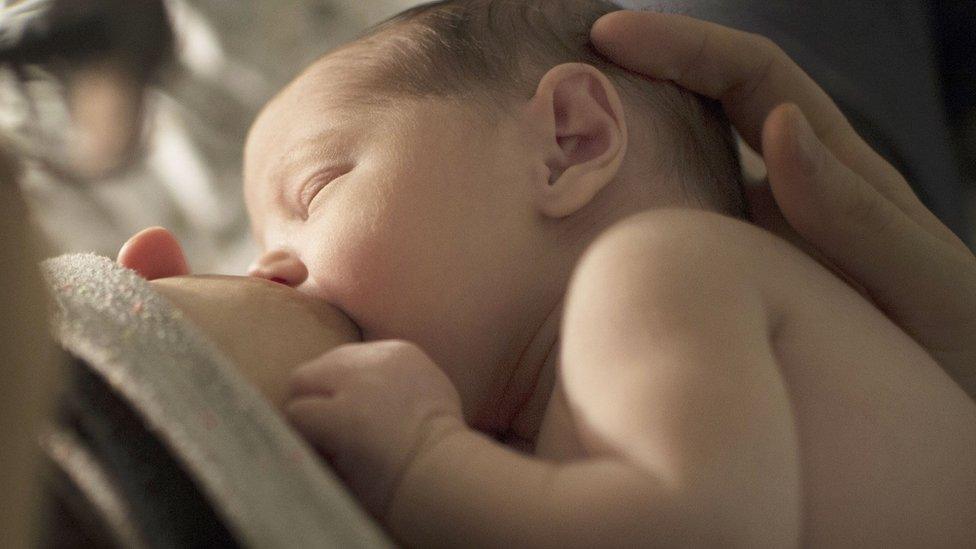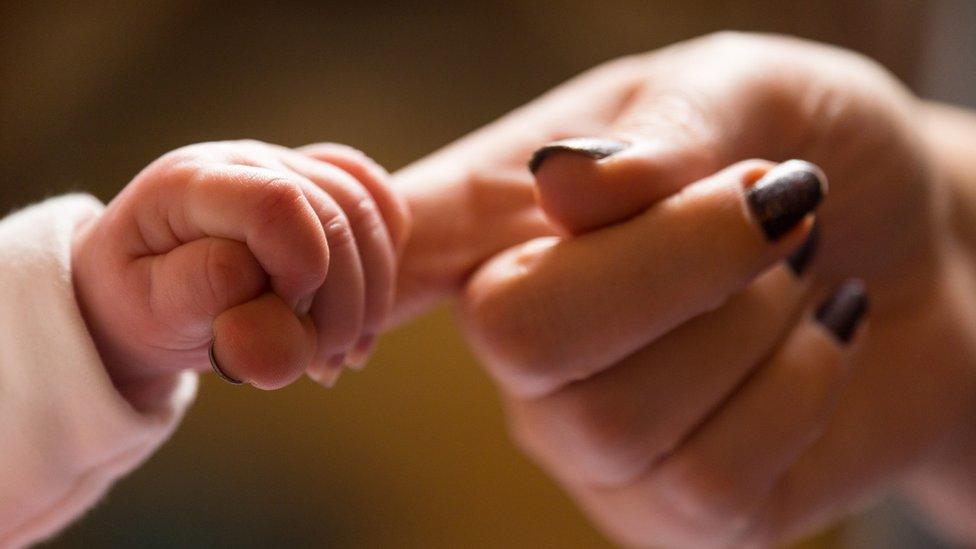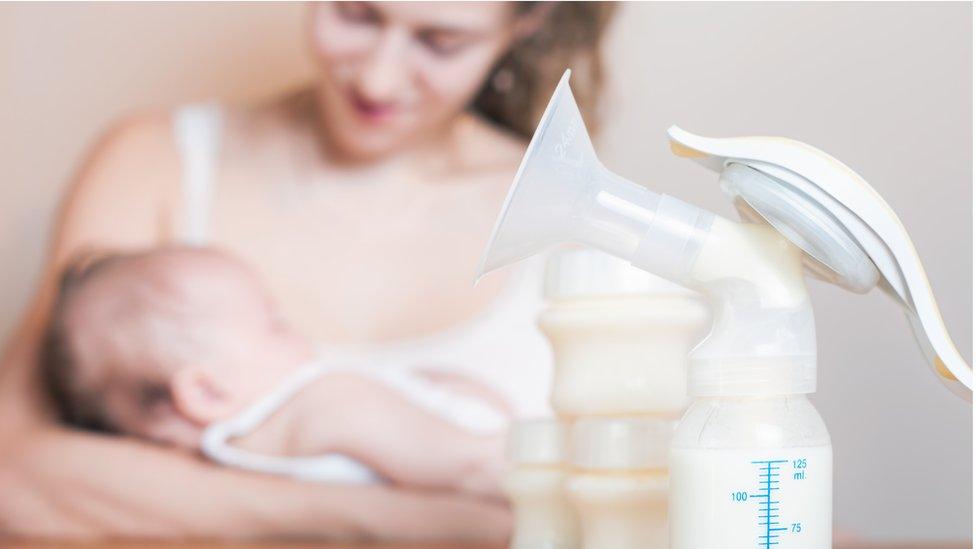Breastfeeding: Timely support could stop 'toe-curling' pain
- Published

The PHA says Northern Ireland has the worst uptake for breastfeeding in the UK
The pain shoots from your nipple up your back, travelling across your shoulders, down to your toes "which curl, and you close your eyes to bear it".
That's how Helen Hancock describes the excruciating breast pain that some women can feel in the early days of breastfeeding.
She had a baby girl in 2009 following an emergency caesarean section.
"Initially I thought we were doing fine, but then very quickly things went south and she started losing a lot of weight. There was a lot of pain and trauma," Ms Hancock told BBC NI.
Northern Ireland has the worst uptake for breastfeeding in the UK, the Public Health Agency (PHA) has said.
While experts say there are many contributing factors, education and support are seen as crucial and are being highlighted as part of this year's World Breastfeeding Week.
Dr Hannah Dearie from the PHA said showing increased support for breastfeeding mums is really important.
"New mums often need information and support to start breastfeeding in the first few days after birth and to continue breastfeeding when they are discharged from hospital," she said.
"Creating supportive environments for breastfeeding mums makes continuing to breastfeed more likely."

'This should be taught in school'
Ms Hancock said she felt very isolated and alone when she was trying to breastfeed, and that the support she was initially offered was not helpful.
"There was a lot of head scratching, a lot of [midwives] grabbing my breast quite strongly and pushing it into the baby's mouth, and she would scream uncontrollably.
"It was quite a traumatic experience to be honest."
She was still in the hospital four days after the birth when she received some tips from "someone with lactation knowledge".
Now a trained breastfeeding counsellor, Ms Hancock believes the support women in Northern Ireland receive falls short.
"This is something that we should be taught about, how our bodies work, what the challenges can be, in our education system from an early age," she said.
"Both women and men should be made aware of it, so that men can give women the support they need."
She is also concerned that women are not being directed to specialist support services like breastfeeding counsellors and lactation consultants soon enough.
Ms Hancock said that on leaving hospital, in addition to community midwives, the resources women are referred to are mostly peer-to-peer (other mothers who have breastfed) support groups.
"That peer support is essential and such an important stepping stone, but it focuses mainly on helping normalise or motivate around breastfeeding."
Breastfeeding counsellors like Ms Hancock, who also operates on a volunteer basis, and lactation consultants are not part of the public health care system.
She said by the time women arrive at her door, perhaps three to six weeks into their breastfeeding journey, they are often tearful and distressed.
"But I have had women come in to me and the pain she is experiencing has stopped within 30 seconds because I have shown her another position that she hadn't been shown before," she added.
Most of the mothers Ms Hancock works with need help with positioning and latch, for more complex issues she'll refer them to a specialist or lactation consultant.
She said the health care system should be working more closely with other breastfeeding support services.

'Liquid gold': The benefits of breastfeeding
Breastmilk is a dynamic, adaptable food that changes composition throughout the day and throughout a single feed to meet a baby's needs.
The first milk is called colostrum, external and is frequently referred to as 'liquid gold'.
The World Health Organization says breastfed children perform better on intelligence tests, external, are less likely to be overweight or obese and less prone to diabetes later in life.
It also says breastfeeding reduces a women's risk of breast and ovarian cancers.
Breastfeeding also aids mums in post-partum recovery and helps with weight management


Mary Cadell, regional officer for the Royal College of Midwives, agrees they are an important resource for women,
"It would be my understanding that that information is available," she said.
"We as midwives work very closely to all of the support services, whether it is around feeding choices or mental health support.
"Community midwives know their community really well, they will know where there is a breastfeeding support group happening or where there is a lactation consultant or breastfeeding counsellor in that area."
Both women are emphatic about the benefits of breastfeeding.
While "moderate discomfort" is natural while establishing breastfeeding, both said that "toe-curling" pain should not be happening and is often being caused by something simple that can be easily fixed - and if not then there could be more deep-rooted issues causing it which also need to be identified.
"Pain should not be happening. Please don't suffer in silence" said Ms Cadell.
"Pick up the phone and speak to your midwife or ring the maternity unit or post-natal ward if it's later in the night.
"Just don't sit in silence."
The Department of Health said it is currently conducting a review of the breastfeeding strategy "to inform the future actions required to improve breastfeeding rates in Northern Ireland".